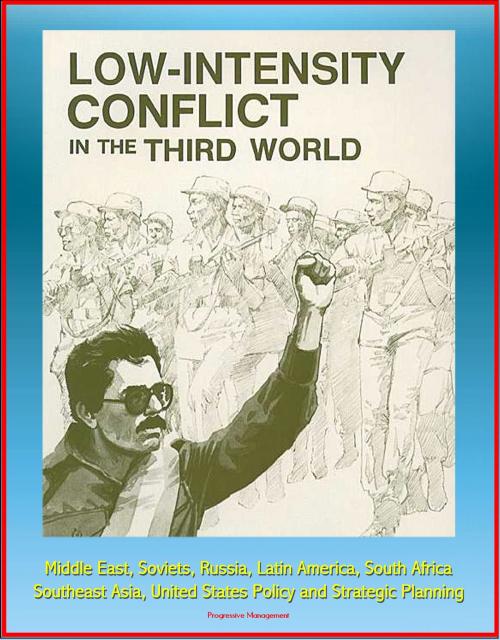Low-Intensity Conflict in the Third World: Middle East, Soviets, Russia, Latin America, South Africa, Southeast Asia, United States Policy and Strategic Planning
Nonfiction, History, Military, United States| Author: | Progressive Management | ISBN: | 9781476499468 |
| Publisher: | Progressive Management | Publication: | August 18, 2012 |
| Imprint: | Smashwords Edition | Language: | English |
| Author: | Progressive Management |
| ISBN: | 9781476499468 |
| Publisher: | Progressive Management |
| Publication: | August 18, 2012 |
| Imprint: | Smashwords Edition |
| Language: | English |
The United States must improve its ability to cope with low-intensity conflict. We must become a great deal better at fighting this kind of war. We may learn quickly, in which case we will be able to cope with low-intensity conflict in the near-term; or we may learn slowly, in which case we will suffer years of frustration.
Low-intensity warfare represents an arena of conflict for today and for tomorrow. There can be little doubt that it poses important problems for American interests and policy. And yet, because of the confusion that surrounds the understanding of low-intensity conflict, the United States has been ill-prepared to face its consequences. This book is a serious effort to make thinking about low-intensity conflict more understandable and, thus, more accessible to those who would form our national response to this pressing issue. It counsels the reader that low-intensity conflict appears in the guise of proxy warfare, religious extremism, ethnic and racial rivalries, and on the heels of failed developmental projects. All these events threaten our friends, our allies, and ourselves.
The Soviet Union and its proxies have come to the conclusion that the global system is vulnerable to low-intensity conflict. We can therefore expect more of it. Only when the United States has developed a flexible capacity to deal with its root causes around the world can we better secure our own interests and suppress Soviet efforts in this domain.
The present volume takes a significant step toward framing the context in which a creative set of policies for low-intensity conflict can evolve. We all have a need to better understand this new, disturbing, and growing phenomenon. With that need in mind, we highly recommend it.
Contents * FOREWORD * PREFACE * LOW-INTENSITY CONFLICT IN THE MIDDLE EAST * Dr. Lewis B. Ware * The Khomeinist Revolution * The Attempted Coup in Bahrain * The Lebanese Imbroglio * Egypt and the Muslim Brotherhood * Islamism in Tunisia * Conclusion * Notes * SOVIET RUSSIA AND LOW-INTENSITY CONFLICT IN CENTRAL ASIA: THREE CASE STUDIES * Dr. Stephen Blank * The Basmachi Insurgency * The Iran Invasions * The Afghanistan Invasion * Notes * FACTORS AFFECTING THE EMERGENCE OF LOW-INTENSITY CONFLICT IN LATIN AMERICA * Dr. Bynum E. Weathers * Nicaragua * Chile * Peru * Conclusion * Notes * LOW-INTENSITY CONFLICT IN SOUTHERN AFRICA * Dr. Thomas P. Ofcansky * Zimbabwe * Namibia * Angola * Mozambique * South Africa * Conclusion * Notes * LOW-INTENSITY CONFLICT IN SOUTHEAST ASIA: CHALLENGES, RESPONSES, AND IMPLICATIONS FOR THE UNITED STATES * Dr. Lawrence E. Grinter * Indonesia * The Philippines * Indochina * Conclusion * Notes * US POLICY AND STRATEGIC PLANNING FOR LOW-INTENSITY CONFLICT * Jerome W. Klingaman * Formulating Strategy for Low-Intensity Conflict * The Problem of Definition * Explicit Language: The Fall from Grace * The Significance of Low-Intensity Conflict * Strategy Implications * Notes
The United States must improve its ability to cope with low-intensity conflict. We must become a great deal better at fighting this kind of war. We may learn quickly, in which case we will be able to cope with low-intensity conflict in the near-term; or we may learn slowly, in which case we will suffer years of frustration.
Low-intensity warfare represents an arena of conflict for today and for tomorrow. There can be little doubt that it poses important problems for American interests and policy. And yet, because of the confusion that surrounds the understanding of low-intensity conflict, the United States has been ill-prepared to face its consequences. This book is a serious effort to make thinking about low-intensity conflict more understandable and, thus, more accessible to those who would form our national response to this pressing issue. It counsels the reader that low-intensity conflict appears in the guise of proxy warfare, religious extremism, ethnic and racial rivalries, and on the heels of failed developmental projects. All these events threaten our friends, our allies, and ourselves.
The Soviet Union and its proxies have come to the conclusion that the global system is vulnerable to low-intensity conflict. We can therefore expect more of it. Only when the United States has developed a flexible capacity to deal with its root causes around the world can we better secure our own interests and suppress Soviet efforts in this domain.
The present volume takes a significant step toward framing the context in which a creative set of policies for low-intensity conflict can evolve. We all have a need to better understand this new, disturbing, and growing phenomenon. With that need in mind, we highly recommend it.
Contents * FOREWORD * PREFACE * LOW-INTENSITY CONFLICT IN THE MIDDLE EAST * Dr. Lewis B. Ware * The Khomeinist Revolution * The Attempted Coup in Bahrain * The Lebanese Imbroglio * Egypt and the Muslim Brotherhood * Islamism in Tunisia * Conclusion * Notes * SOVIET RUSSIA AND LOW-INTENSITY CONFLICT IN CENTRAL ASIA: THREE CASE STUDIES * Dr. Stephen Blank * The Basmachi Insurgency * The Iran Invasions * The Afghanistan Invasion * Notes * FACTORS AFFECTING THE EMERGENCE OF LOW-INTENSITY CONFLICT IN LATIN AMERICA * Dr. Bynum E. Weathers * Nicaragua * Chile * Peru * Conclusion * Notes * LOW-INTENSITY CONFLICT IN SOUTHERN AFRICA * Dr. Thomas P. Ofcansky * Zimbabwe * Namibia * Angola * Mozambique * South Africa * Conclusion * Notes * LOW-INTENSITY CONFLICT IN SOUTHEAST ASIA: CHALLENGES, RESPONSES, AND IMPLICATIONS FOR THE UNITED STATES * Dr. Lawrence E. Grinter * Indonesia * The Philippines * Indochina * Conclusion * Notes * US POLICY AND STRATEGIC PLANNING FOR LOW-INTENSITY CONFLICT * Jerome W. Klingaman * Formulating Strategy for Low-Intensity Conflict * The Problem of Definition * Explicit Language: The Fall from Grace * The Significance of Low-Intensity Conflict * Strategy Implications * Notes















